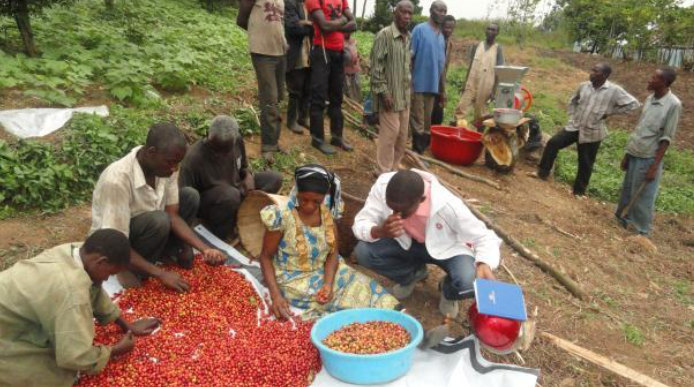To break the cycle of poverty among small farmers, it is enough to strengthen their financial autonomy in order to increase their production capacity. This is the credo of an agricultural cooperative, TUFAIDIKE RDC, which seeks to transform the living conditions of small farmers involved in the coffee, soybean and potato sectors.
TUFAIDIKE RDC is an agricultural cooperative located in the provinces of South Kivu and North Kivu in the east of the DRC, precisely in the territories of Kalehe and Masisi. Its commitment consists of supervising and supporting small family farmers by facilitating their financial inclusion and helping them to reduce the impact of health on household income and food security.
Its mission is to contribute to the reduction of poverty among small farmers by producing and marketing certified organic quality coffee, with a view to combating economic and social exclusion through accessibility to tailor-made financial and non-financial solutions. and adapted to local realities.
Good reasons to act
Since its creation in 2012, TUFAIDIKE RDC has been a key player in the granting of micro-credits to small farmers. Grouped together within Mutuelles de solidarité (MuSo) and village savings and credit associations (AVEC), access to adequate financial services becomes within reach, whereas conventional banks could not provide them.
It all started with an astonishing constant: “Many small farmers were unable to obtain credit from conventional financial institutions when they needed it to finance their activities”.
It is against this reality that TUFAIDEKE RDC acts to deconstruct the false beliefs according to which agriculture is a profession of the poor, low-paying and financially unviable.
Indeed, the reaction of conventional banks to the needs of small farmers relentlessly reflects the exclusion of this category of economic actors from the formal banking system. Far from being a mere pretext, the excuse that they lack guarantees is not enough to legitimize this discrimination against banks.
Quite the contrary, it is clear that banks, like any other enterprise with a priori economic aims, pay less and less attention to their social mission than to their economic interests.
Result? The financial services offered by banks lack, for the most part, flexibility and remain – in many aspects (loan amounts, time, interest, non-financial services) – poorly adapted to the realities of small farmers who often have low incomes. Therefore, this way of doing banking becomes counterproductive for the local economy, especially since it does not release the full productive potential of small farmers whose role in economic development is nevertheless decisive.
A proven approach
Given the above, TUFAIDIKE RDC is an alternative financing actor that provides small producers with micro-credits from groups to finance their activities for the purchase of inputs (seeds, fertilizers, agricultural tools, etc.) while giving the possibility of cultivating on sufficiently large areas in order to earn more income.
Thanks to the income from these activities, small producers are able to finance the primary needs of households such as health, children’s schooling, food, etc.
In addition, TUFAIDIKE RDC is a model of social innovation that is tackling the impact of health on poverty and food insecurity. Often, small-scale farmers could spend almost 60% of their income to pay health bills, which affects household purchasing power as well as household agricultural labor.
This is how TUFAIDIKE DRC’s approach offers more than 500 members (beneficiaries) a health micro-insurance system to facilitate access to medical care. From a subscription of $20, many farming households manage to secure their families and thus cushion the impact of health on their income. In this context, TUFAIDIKE has signed agreements with the medical structures in its various areas of action to guarantee care for members in the event of a disease or other epidemic such as cholera.
Ultimately, TUFAIDIKE RDC is a proven solution in improving the socio-economic conditions of low-income small producers through its various financial and non-financial services (training, financial education, business management consulting , monitoring and support) adapted to the needs of women and young people to strengthen their autonomy, catalyze the creation of remunerative jobs and promote agricultural entrepreneurship.
MABELA P.
Photo: A family stands at the door of their home in Debre Markos, Ethiopia. Credit: Simon Scott.


Comments are closed, but trackbacks and pingbacks are open.